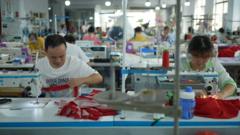China has rallied for international solidarity in response to President Trump's significant tariff hikes that have now reached 104% on key imports. In an op-ed published by the state-run China Daily, it emphasized that "Global unity can triumph over trade tyranny" and called on partners in the Asia-Pacific region, including Japan and South Korea, along with the European Union, to champion free trade and resolve the escalating trade tensions.
Spokesperson for the Chinese Ministry of Foreign Affairs, Lin Jian, reiterated Beijing's unfavorable view of the "hegemonic and bullying practices" manifested through the tariffs, which have compounded difficulties in an already fragile domestic market where consumer spending remains subdued. Major firms, including cross-border e-commerce companies, report that the soaring tariffs have severely impacted their profit margins, with some estimates indicating that tariffs exceeding 35% could completely eliminate gains made in US and Southeast Asian markets.
The imposition of these new levies comes at a critical juncture for companies like Fuling, which supplies disposable tableware to major fast food chains in the US. The firm indicated that the additional tariffs would dramatically impair its operations, given that a substantial portion of its revenue is derived from the US market. To counter the negative impact, Fuling has begun operations in Indonesia. However, the situation has worsened as Indonesian exports are now facing a 32% tariff, further complicating the landscape for Chinese businesses.
Notably, economists have expressed concerns regarding a potential recession in both the US and global economies as a result of these tariffs. The broad-reaching measures—such as a baseline 10% tariff on nearly all foreign imports and heightened rates for countries like Vietnam and Cambodia—prompt criticism from various sectors, including vocal opposition from business leaders like Elon Musk.
Though there remains a glimmer of hope for negotiations, a communication gap between Trump and Chinese President Xi Jinping persists. Analysts are predicting that the tariffs will necessitate a significant restructuring of China's economy, urging a shift towards domestic consumption to mitigate long-term susceptibility.
The American Chamber of Commerce in China has voiced its apprehensions regarding the implications of such upheaval, arguing that the unexpected level of disruption raises questions about the supposed benefits of these tariffs to the economies in question. If the tariffs remain unchanged, experts warn of a potential collapse in trade relations between the US and China, rendering business operations untenable.
Spokesperson for the Chinese Ministry of Foreign Affairs, Lin Jian, reiterated Beijing's unfavorable view of the "hegemonic and bullying practices" manifested through the tariffs, which have compounded difficulties in an already fragile domestic market where consumer spending remains subdued. Major firms, including cross-border e-commerce companies, report that the soaring tariffs have severely impacted their profit margins, with some estimates indicating that tariffs exceeding 35% could completely eliminate gains made in US and Southeast Asian markets.
The imposition of these new levies comes at a critical juncture for companies like Fuling, which supplies disposable tableware to major fast food chains in the US. The firm indicated that the additional tariffs would dramatically impair its operations, given that a substantial portion of its revenue is derived from the US market. To counter the negative impact, Fuling has begun operations in Indonesia. However, the situation has worsened as Indonesian exports are now facing a 32% tariff, further complicating the landscape for Chinese businesses.
Notably, economists have expressed concerns regarding a potential recession in both the US and global economies as a result of these tariffs. The broad-reaching measures—such as a baseline 10% tariff on nearly all foreign imports and heightened rates for countries like Vietnam and Cambodia—prompt criticism from various sectors, including vocal opposition from business leaders like Elon Musk.
Though there remains a glimmer of hope for negotiations, a communication gap between Trump and Chinese President Xi Jinping persists. Analysts are predicting that the tariffs will necessitate a significant restructuring of China's economy, urging a shift towards domestic consumption to mitigate long-term susceptibility.
The American Chamber of Commerce in China has voiced its apprehensions regarding the implications of such upheaval, arguing that the unexpected level of disruption raises questions about the supposed benefits of these tariffs to the economies in question. If the tariffs remain unchanged, experts warn of a potential collapse in trade relations between the US and China, rendering business operations untenable.



















